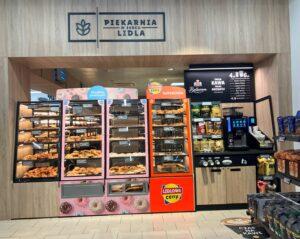Lidl wins through its ‘breadification’ strategy in the UK
British supermarkets are being criticised for allegedly misleading marketing in their bakery department, and German discounter Lidl’s bakery strategy may be indirectly to blame. The German discounters combines its bake-off assortment with its Lidl Plus loyalty scheme to drive footfall.

Photo: Sebastian Rennack

Sebastian Rennack
international retail analyst
Aletos Retail
The UK’s ‘Sustain’ alliance for better food and farming has lodged complaints against Tesco, Sainsbury’s, Morrisons, the Co-op and Lidl with several local trade bodies. It says the retailers have misused the ‘freshly baked’ claim on product packaging and POS (point of sale) materials. Instead of scratch bakeries, which make dough from basic ingredients, according to Sustain most of the retailers operate ‘bread tanning salons’, which bake pre-packaged frozen products enhanced with rising agents and other additives.
Price pressure in the category is causing major retailers to rethink their in-store baking strategy. Sainsbury’s, the second largest national grocer, recently announced that it would close its full-cycle bakeries and move to a bake-off model, citing consumer demand for affordability. Dough for the in-store bakery would be produced ‘elsewhere’. Market leaders Tesco and the Co-op have made similar statements.
It is German discounter Lidl that is putting British retailers between a rock and a hard place. According to figures from market researchers Kantar in April this year, Lidl has overtaken market leader Tesco in terms of share of the in-store bakery market. In the first quarter, Lidl’s share was 18.2%, with Tesco in second place on 18.0%, followed by Sainsbury’s on 13.7%.
In-store bake-off departments are at the heart of the discounter’s commercial approach. After the initial investment, Lidl uses its large assortment with a focus on sweet and savory convenience items, multiple bake-offs throughout the day and low prices to drive footfall.
Kantar figures from May show that Lidl UK was able to boost in-store bakery sales by more than 40% over a 12-week period by combining bakery offers with vouchers for its Lidl Plus loyalty scheme. Researchers found that a quarter of shoppers’ baskets contained bread, cakes or pastries from the bake-off ranges.
Lidl’s ‘breadification’ strategy is an international standard. On the one hand, Lidl can source deep-frozen dough from its parent company Schwarz Group’s own large-scale bakery, Bonback in Germany. Vertical integration allows the discounter to operate at the lowest cost, making the labour-intensive large-scale bakeries of its competitors a questionable endeavor. On the other hand, the discounter has optimised the technological process to such an extent that it can react faster than traditional bakeries. The baking time for a bake-off roll is less than ten minutes, for bread around twenty minutes. At the same time, technological evolution has helped to streamline product recipes, so that the number of baking programmes – relevant to energy and labour costs – has been reduced in recent years.
Ultimately, it is the market trend towards convenience and the current strong focus on price that could accelerate the decline of traditional craft. While Sustain aims to raise awareness of healthier eating options, consumers do not yet seem to appreciate the difference between the traditional ‘cold rise’ baking cycle and the technology-driven fast track, at least not when it comes to voting with their wallets. Whether or not the end product deserves the term ‘fresh’, hot rolls and bread baked several times a day seem to win the consumer’s vote of confidence – naturalness seems to be of secondary importance.
Related news
Lidl Netherlands Aims For 46% Healthy Food Sales By 2030
🎧 Hallgasd a cikket: Lejátszás Szünet Folytatás Leállítás Nyelv: Auto…
Read more >Tesco sets out store expansion plans in 2026 including five former Amazon Fresh sites
🎧 Hallgasd a cikket: Lejátszás Szünet Folytatás Leállítás Nyelv: Auto…
Read more >Brits Embrace At‑Home Celebrations While Germans Cut Back on Valentine’s Day Spending
🎧 Hallgasd a cikket: Lejátszás Szünet Folytatás Leállítás Nyelv: Auto…
Read more >Related news
(HU) A nap mondása
🎧 Hallgasd a cikket: Lejátszás Szünet Folytatás Leállítás Nyelv: Auto…
Read more >(HU) A nap mondása
🎧 Hallgasd a cikket: Lejátszás Szünet Folytatás Leállítás Nyelv: Auto…
Read more >








